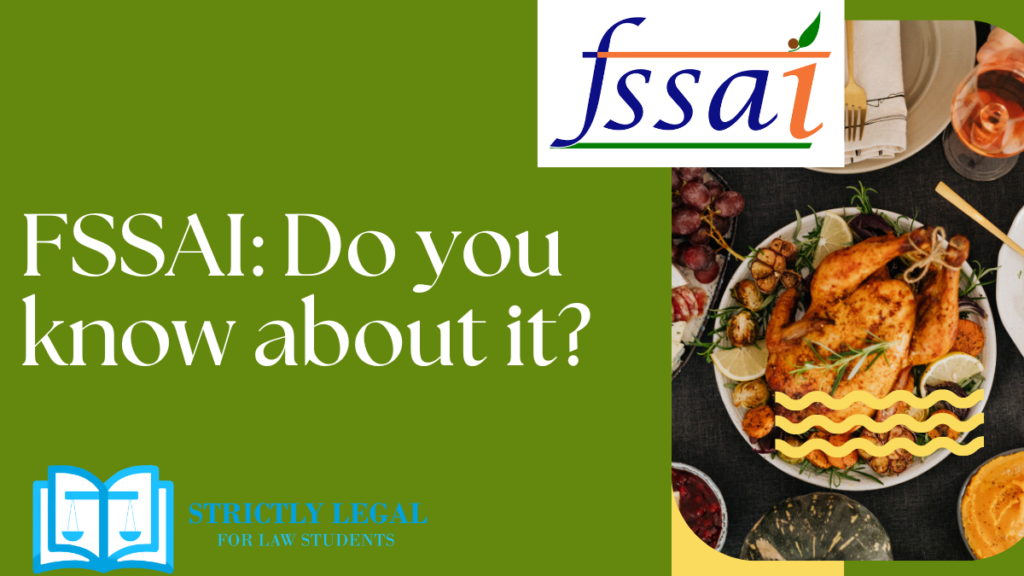Starting from the basics, the very full form of FSSAI is Food Safety and Standards Authority of India (FSSAI). As the name suggests, food is the basic credential of human beings as well as animals, rather, to be very practically presented, food is the only subject that pushes a man to have a job of his own in order to eradicate hunger. Having realized the significance and depth of such an important matter, the government has organizations that work scrupulously to make certain that the food we consume may it be in fancy restaurants or the most loved street food by students is safe, healthy and hygienic. Out of all, one such organization is the FSSAI that is a stuatory body that is entrenched under the Ministry of Health & Family Welfare, GOI. The FSSAI has been established under the Food Safety and Standards Act, 2006.
Table of Contents
Was their any Need of Such an Act?
As mentioned above, the Act was the need of the hour to have a regulatory body that ensures the food that the general public consumes is consumable. We’ve often come across news where a group of people or kids suffer from immense stomach ache or food poisoning for having food from a particular catering or a restaurant or a street food vendor. Why does so happen? The answer is exactly what you think. The people vending or cooking the food are often careless about the health and hygiene of the customers and only focus on “one-way benefit” i.e., by selling off their dishes as quick as possible irrespective of they being stale or unhygienic. However, post the enactment of the Food Safety and Standards Act, 2006 all the restaurant owners as well as the street vendors make sure that the food they serve is consumable as per the guidelines of the FSSAI. Surprise inspections from the officers have often led to taking into custody of the street vendor’s stalls or shutting down of various eateries, which further acts as a warning as well as caution to others following the same practice without getting caught.
What exactly is FSSAI?
In collaboration with the Ministry of Health and Family Affairs being the parent organization the Food Safety and Standards Association of India (FSSAI) quintessentially throws light upon the food security, immunizing the public health vide its regulations and guidelines as duly prescribed under the Act. FSSAI has its regional offices Delhi, Kolkata, Cochin, Mumbai and Guwahati being its headquarters at Delhi. However, if you want to know about FSSAI that’s not the entire information.
Before all else, any human being/ individual (natural or artifical) that is involved in food business may it be manufacturing, processing, storage, distribution or sale of food has to mandatorily register themselves with the FSSAI or have a food license. [Both FSSAI registration and FSSAI license are different as they depend on the nature and size of business]. The FSSAI registration number is a 14-digit long number that enumerates the details of the assembling state along with the producer’s permit. A sample of the 14 digit FSSAI registration number can be accessed here.
Types of FSSAI Registration
FSSAI registration solely depends on the nature of type of business, their annual turnovers and capacity of production. The Food Business Operators (FBOs) have been given the options of three varieties of licenses i.e., the Basic Registration, State License and Central License.
Basic Registration:
For the FBOs having an annual turnover of lesser than 12 lacs per annum have to mandatorily obtain the Basic Registration FSSAI. It covers FBOs such as mess, canteens, manufacturing, packaging etc.
State License:
For the FBOs having an annual turnover of more than 12 lacs per annum and lesser than 20 crores per annum have to mandatorily acquire the FSSAI State License. This category is applicable to small to medium sized manufacturers, storage units, transporters, retailers, restaurants etc.
Central License:
For the FBOs having an annual turnover of more than 20 crores per annum have to mandatorily acquire the FSSAI Central License. This type of license is applicable to importers, manufactures, operators in Central Government, Railways, airports, shipyards etc.
How does one register themselves under FSSAI?
Getting yourself registered under the FSSAI is an equally essential task. However, here are the crips and short steps that prescribes you steps to get yourself successfully registered.
- First and very basic way is to check the category one’s business fall under as per their annual turnovers in the FoSCoS ‘s official website which might not be a rocket science, yet one has to be careful to conclude upon the category of business they fall into.
- The next very step is the registration under FSSAI that requires essential documents for the three abovementioned categories of FBOs that is also mentioned in the official website of FSSAI. As the category of business will only portray the kinds of documents one needs.
Is there a License for Cloud Kitchens?
As mentioned earlier, any business that involved food and providing of food in any form requires license. So does the notion of Cloud Kitchens, one of the most popular way of homely business in the modern era. Cloud Kitchens are basically restaurants with no dine in option but only avails takeaways or deliveries. So, it very well requires a food license. Hence, depending on their annual turnover, they can acquire an FSSAI license under Basic, State or Central category.
Expiry of Food License
The important it is to acquire the food license, the wiser it is to renew the same. The FSSAI License is issued for a period of one year or five years and hence, the application for renewal of a food license must be applied before 30 days or a month’s expiry of the same.
Conclusion
The sanity and hygiene of food is a worldwide concern across the globe. Food, being the most essential need of any individual needs to be made sure that it is consumable and hygienic as even a minimal lacuna in this will lead to heinous consequences. It is only a boon for the customers and general public to be given such benefits as the surprise food inspections, keeping a checks on the FBOs at regular intervals, ensuring the food is consumable only strengthens the trust of the people.

Law student.
Turning legal insights into engaging narratives.





